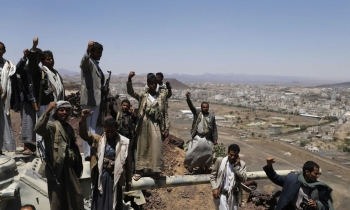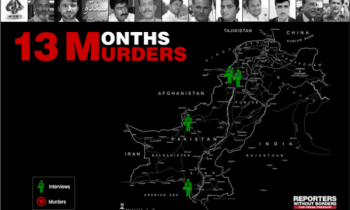A thousand mourners placed flowers around the casket of Anna Politkovskaya in Moscow on Tuesday, weeping for one of Russia's most famous journalists, who was assassinated last week.
This is a huge story -- eclipsed by the North Korean nuclear test -- that says much about the Russia of today and the future. Politkovskaya was the Bob Woodward and the Seymour Hersh of Russian journalism rolled into one in a country where investigative reporting can be fatal.
She's the 13th Russian journalist killed in a contract-style murder since Russian President Vladimir Putin took office in 2000. According to the Committee to Protect Journalists, none of the cases has been solved.
A harsh critic of Putin's rule, Politkovskaya risked her life to report on government corruption and human rights abuses. She had been threatened, jailed, exiled, even poisoned -- in a previous effort to kill her. She was gunned down in broad daylight in her apartment lobby by an assassin who left his Makarov pistol by her body -- the trademark of a Russian hit man. She was murdered just before the scheduled publication of an exposé of Russian-sanctioned torture in Chechnya.
A Russian journalist friend said on the phone, ``Can you imagine if Bob Woodward was killed in his doorway? Whatever your presidents think of Woodward, he is still reporting. There is something wrong with this country.'' That ``something'' is evident in Putin's response to Politkovskaya's death.
The Russian leader has made no statement to his own people about the crime, mentioning it only in response to inquiries from President Bush and German Chancellor Angela Merkel. But he denigrated Politkovskaya while in Germany this week, saying her work was of ``very minor'' import to Russia. He said her death was of concern mainly to human rights circles in the West.
Pro-Kremlin newspapers (most of Moscow's media are now government-controlled) even suggested that Russian liberals might have arranged the murder to destabilize the homeland. Putin told Bush he would order an investigation, but no one should expect her real murderer to be found.
This vicious killing is a reminder of how far Russia has swerved back toward authoritarianism under Putin. In 1990, I worked as an exchange journalist for Moscow News and watched Soviet journalists take advantage of glasnost and, for the first time, really report on political issues. Under Putin, the Kremlin has taken back control of national television and muzzled all but a few national newspapers. Few journalists have the courage of Politkovskaya, when the penalty can be death.
Her tragedy recalls the similar death in 1998 of the courageous, internationally known human rights campaigner Galina Starovoitova. She, too, was gunned down in her lobby, in St. Petersburg. I visited her grave one week after her death and watched long lines of mourners toss flowers and poems on the tomb, their tears frozen by cold.
At that time, Putin was head of the FSB -- the KGB successor organization -- and could have used his vast resources to find the killer. But Starovoitova's assassin has never been found.
It doesn't matter whether such killings are ordered by the Kremlin or regional politicians, or, in Politkovskaya's case, possibly by a Kremlin-backed Chechen leader. We'll never learn who contracted these hits because the Kremlin has no interest in such revelations. The deaths of journalists and human rights activists send a sharp message to Russians: Don't criticize, or you, too, may wind up dead.
Flush with oil revenue with which to pacify his public, Putin has muzzled dissent at every level. He has neutered the regional governments and national parliament (and intimidated Russia's neighbors, such as Georgia).
He has also tamed the so-called oligarchs -- businessmen who accumulated vast wealth after the Soviet breakup and presented a political threat to the Kremlin. One such oligarch -- oilman Mikhail Khodorkovsky -- was sent to Siberia for eight years on trumped-up charges; the Kremlin broke up and took control of his vast, international oil company, Yukos. Some human rights experts fear Khodorkovsky may be murdered while behind bars. Only recently, the deputy central bank chairman, Andrei Kozlov, who campaigned against bank crime, was shot dead in Moscow.
Putin -- who once said he wanted to impose a ``dictatorship of law'' -- has no interest in law when it comes to murders of journalists or other critics. European leaders who depend on Russia for natural gas should harbor no illusions that Putin's Russia operates like a normal country. Neither should would-be international investors.
That's the message conveyed by Putin's cavalier attitude toward Politkovskaya's death.
TRUDY RUBIN is a Philadelphia Inquirer columnist.









